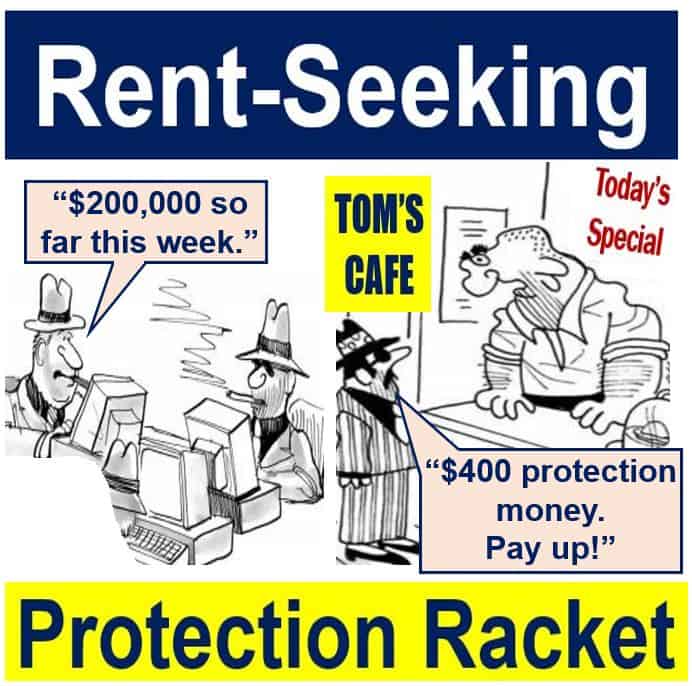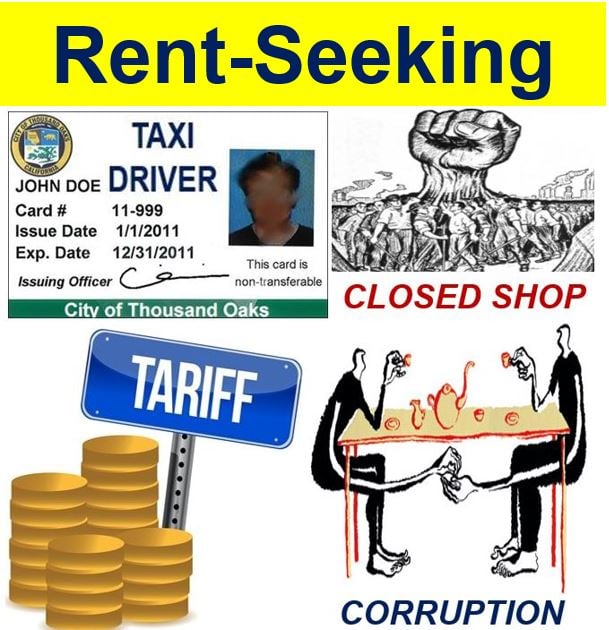Rent-Seeking, in economic and public-choice theory, refers to attempting to increase one’s share of current wealth without producing or creating any additional wealth.
Rent-seeking is the equivalent of trying to get a larger slice of the wealth cake, without trying to make that cake any bigger. It is a **zero-sum game strategy – the rent-seeker’s gain is somebody else’s loss.
** A Zero-Sum Game is a business situation or game in which there is one winner and one loser. The winner’s gain is equivalent to the loser’s total loss – hence the term ‘zero-sum’.
Rent-seeking can distort market outcomes and reduce overall economic efficiency by diverting resources away from productive uses.
If one individual uses the resources of another person, organization, company, or any entity to obtain economic gain – to make themselves richer – but does not reciprocate any benefits to society through the creation of new wealth, they are rent-seeking.
Pervasive rent-seeking activities can lead to economic inequality, concentrating wealth in the hands of a few while stifling opportunities for the broader population.

Rent-seeking behaviors of lobbying
When a commercial enterprise lobbies the national government for tariff protection (levy taxes on imports), loan subsidies, or grants – things that do not create any benefit for the nation – it is rent-seeking. The strategy or activity creates no extra wealth, but the company gets richer, and the taxpayer has to foot the bill.
Imagine you are the head of a company and succeed in getting subsidies or persuading the government to introduce legislation that limits competition and makes it much more difficult for new competitors to enter your market – barriers to entry – you have managed to grow your share of current total wealth in that sector without adding anything to make that market bigger – you have been involved in rent-seeking behavior.
Apart from earning income without creating any additional wealth, you have not put any of your capital at risk either.
Rent-seeking licensing rackets
Any market sector or profession where there is a closed-shop system, rent-seeking exists. A closed shop is any area of activity that is restricted to a particular small group.

Sometimes, requiring a license is necessary and makes sense. For example, doctors are not allowed to practice if they don’t have a license – that is to protect the well being of patients. Pilots are not allowed to fly passenger planes unless they have a special license – that is to protect the lives of the passengers. In such cases, license requirements make sense – the reasons are obvious.
However, there are some markets in the world where an onerous, special license is required if you want to be a florist, taxi drive, or even an interior decorator.
Clearly, in those cases, the license requirements are simply barriers to entry – they have nothing to do with protecting the consumer. They are there simply to protect the existing competitors and give them an unfair and uncompetitive advantage. License requirements are often examples of rent-seeking behaviors.
If you need to get a time-consuming, expensive, and extremely hard-to-acquire license to become a taxi driver, there will be fewer competitors in that market. If fewer competitors are permitted to operate within that sector, it means that each player gets a bigger slice of the wealth pie.
Licensing requirements contribute absolutely nothing to the creation of additional wealth, i.e. the wealth pie does not get any larger because of them.
Most closed-shop systems are bad for the consumer. When there is **perfect competition prices are kept low. When there is a lack of competition – imperfect competition – and rent-seeking behaviors are rife, prices remain high.
** Perfect competition does not exist in any country – it is a theoretical free-market Utopia where there are lots of sellers and buyers, none of whom is able to have any significant impact on the prices of products or services. All the suppliers and consumers seek to maximize their profit (income).
Rent-seeking in government
Corruption among public officials (civil servants) and politicians is also within the notion of rent-seeking. While corruption in government is higher in some countries than others, no nation on Earth is completely free of it.
Civil servants who work in the tax office, for example, and solicit and extract bribes for coming to special arrangements with individuals or companies, or offer to look the other way, are guilty of rent-seeking.
These bureaucrats are enriching themselves without contributing anything to the wealth of the nation.
When a regulatory agency – which was first set up to protect consumers and police a certain industry – changes and eventually prioritizes the rights and benefits of the companies in that sector over those of consumers – this is known as regulatory capture and means that rent-seeking has raised its ugly head.
A good way of appreciating what regulatory capture is, is to imagine a group of sheep farmers that sets up a Sheep-Protection Agency. The agency’s aim is to protect the sheep from wolves. However, after a few years, more and more wolves become members of the agency. Eventually, the protection and rights of wolves become more important for the agency than the protection and rights of sheep.
Auburn University’s Glossary of Political Economy Terms says that rent-seeking behavior is:
“The expenditure of resources in order to bring about an uncompensated transfer of goods or services from another person or persons to one’s self as the result of a “favorable” decision on some public policy.”
“The term seems to have been coined (or at least popularized in contemporary political economy) by the economist Gordon Tullock. Examples of rent-seeking behavior would include all of the various ways by which individuals or groups lobby government for taxing, spending and regulatory policies that confer financial benefits or other special advantages upon them at the expense of the taxpayers or of consumers or of other groups or individuals with which the beneficiaries may be in economic competition.”
Video – What is Rent Seeking?
This video, from our YouTube partner channel – Marketing Business Network – explains what a ‘Rent Seeking’ is using simple and easy-to-understand language and examples.
